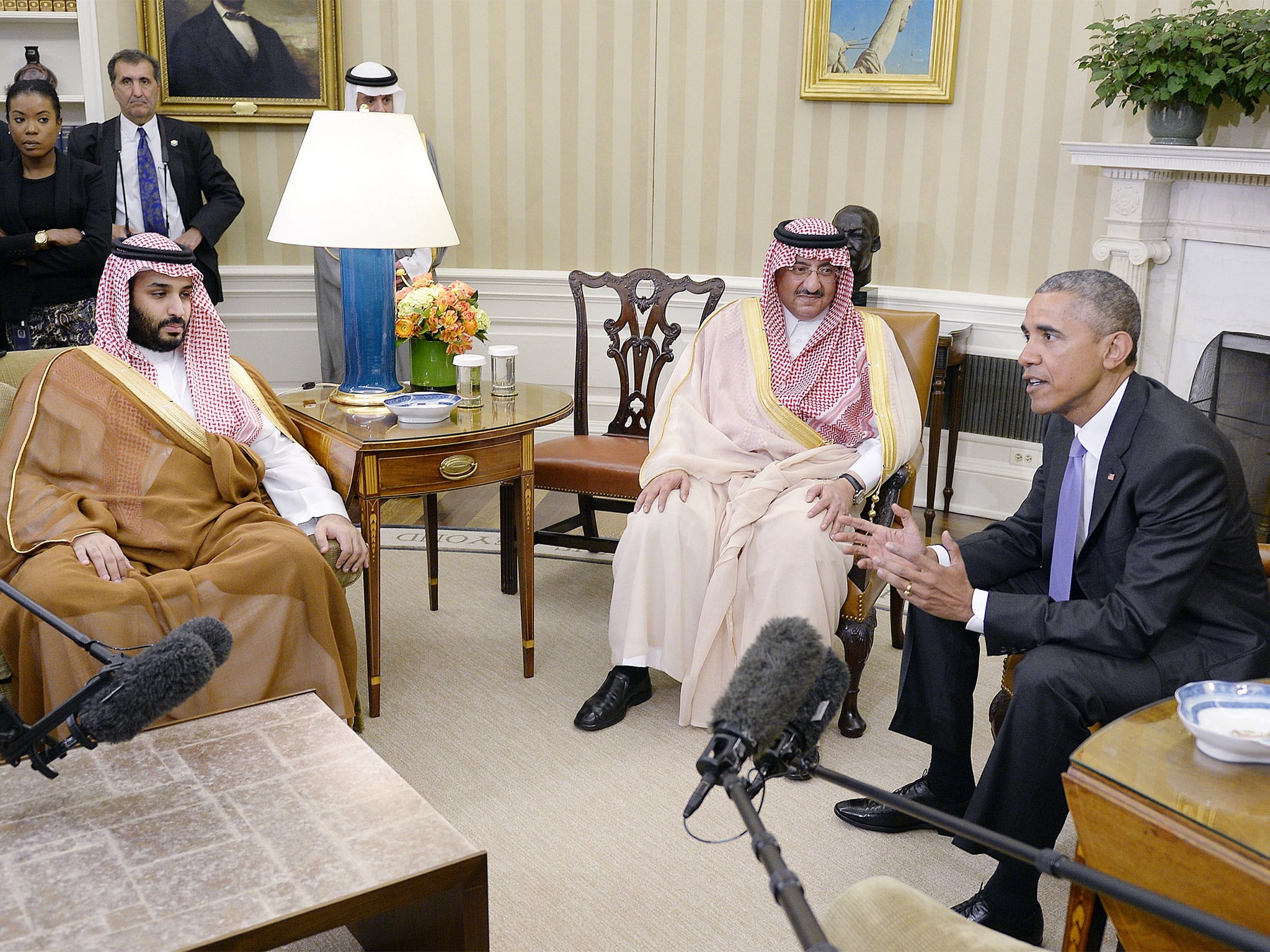US-Gulf summit: Saudi King 'snubs' President Obama over his perceived inattention to the region
Last-minute failure to attend White House meeting bodes ill for the gathering, with tensions expected over the Iran nuclear deal and calls for a defence treaty

Some have suggested it was a debacle before it even started, after the Saudi King pulled out, but President Barack Obama betrayed no misgivings as he opened a two-day summit with six Gulf allies.
The potentially fractious meeting is meant to allay suspicions that the United States is putting too much focus on securing a nuclear deal with Iran – their common foe – at the expense of their defence interests.
Mr Obama made no mention of the negotiations as he welcomed Saudi Arabian leaders to the Oval Office, saying only that the two countries were building their relationship “during a very challenging time”.
As part of the gathering, which is to open with a White House dinner and continue at the presidential retreat at Camp David in Maryland, Mr Obama will try to keep the countries from wandering any further from America’s orbit.
While Riyadh insisted that King Salman was remaining at home to monitor the kingdom’s ongoing military operations in Yemen, his last-minute no-show was widely interpreted as a snub to Mr Obama to convey dissatisfaction with his perceived inattention to the region.
Among the delegations in Washington from the six states of the Gulf Co-operation Council, GCC – they are Qatar, Kuwait, Saudi Arabia, Bahrain, the UAE and Oman – only two, Qatar and Kuwait, ended up sending their leaders. While the Gulf states were expected to push for agreements that would bind the United States to come to their defence in the event of attack – similar to commitments between Nato members – the White House has made clear such a step would face resistance on Capitol Hill. However, the meeting may end with new pledges from the US on enhanced defence co-operation, including undertakings to supply more hardware and training.
Even before it got under way, the White House pushed back against the notion the summit was a diplomatic disaster. “We very much feel that we have the right group of people around the table to have a very substantive discussion,” Ben Rhodes, the deputy national security adviser for strategic communications, told reporters in a briefing. “It’s, we believe, the right degree of representation.”
In an interview with MSNBC, Mr Rhodes was pressed on whether King Salman’s withdrawal days before the summit had to be seen as a “snub”. “No, absolutely not,” he replied. “Neither the United States or Saudi Arabia sees this in any way as a snub.”
Standing in for the king in Washington are Crown Prince Mohammed bin Nayef and Deputy Crown Prince Mohammed bin Salman. Mr Obama welcomed both men to the Oval Office for a round of separate US-Saudi Arabia talks in advance of the wider summit. He spoke of the challenges facing the two countries, including the war in Yemen and the threat of Isis.
The alliance between the countries has come under unprecedented strain. Saudi Arabia has voiced deep concern that the framework deal that was reached six weeks ago between the six world powers and Iran – which would see it win relief from sanctions in return to submitting to limits on its nuclear programme – would, if concluded next month, allow Tehran, infused with new cash, to develop an atomic bomb.
All of the Gulf states were expected to emphasise that Iran is already extending its influence across the region and threatening its stability, not least in Yemen where it is believed to be assisting the Houthi rebels. The continuing Saudi-led campaign to push them back is widely seen as a proxy war with Iran.
Washington has watched with alarm as Saudi Arabia and the other Gulf states have shown an increasing willingness to take the initiative to protect their interests. “There is a determination among us now that if there are security issues, we have to take action and we will,” a senior Arab diplomat told CNN this week. “We don’t have to ask America’s permission. We of course will collaborate with the US, but we won’t wait for America to tell us what to do.”
Frustration with Washington in the region dates back to 2011, when Mr Obama was considered to be too supportive of the Arab Spring. There is annoyance that under his watch the US has not been tougher on Israel about peace with Palestine. Doubts about Mr Obama multiplied, meanwhile, when he threatened to launch strikes against Syria but in the end backed down.
More encouraging for the states, however, has been the leading role the US has taken in confronting the other big threat to security: the advance of Isis in Iraq and Syria. Mr Obama is expected also to underline the role Washington has been playing behind the scenes to support the Saudi-led military action in Yemen as well as the Pentagon’s deployment of US warships to waters close to Yemen.
Subscribe to Independent Premium to bookmark this article
Want to bookmark your favourite articles and stories to read or reference later? Start your Independent Premium subscription today.

Join our commenting forum
Join thought-provoking conversations, follow other Independent readers and see their replies